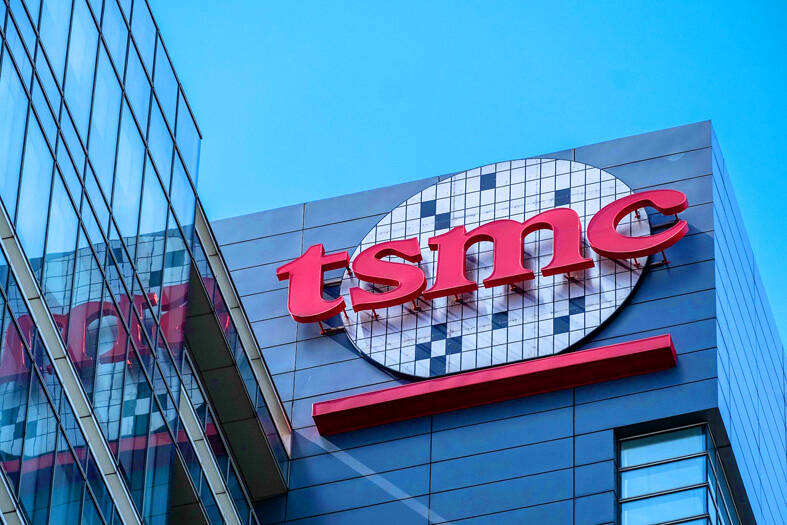Taiwan Semiconductor Manufacturing Co (TSMC, 台積電) yesterday said it has signed a joint procurement contract with ARK Power Co (誠新電力) to provide 20 terawatt-hours of solar energy as part of the chipmaker’s broader efforts to reduce its carbon footprint together with companies in its supply chain.
TSMC is leading an environmental, social and governance innovation model of domestic renewable energy joint procurement by creating a platform to match renewable energy with industrial power consumption.
The agreement enables TSMC as well as suppliers and subsidiaries that would like to purchase renewable energy to be matched with ARK Power, which assists in assessing their electricity demand and planning the best blueprint for renewable energy adoption.

Photo: Lam Yik Fei, Bloomberg
Since last month, TSMC suppliers have signed memorandums of understanding to procure renewable energy to jointly help the local semiconductor supply chain reduce the industry’s carbon footprint, TSMC said in a statement.
Through the joint procurement model, participating suppliers are assured of long-term contracts with stable pricing, thus lowering the threshold for TSMC suppliers and subsidiaries to adopt renewable energy, it said.
The agreement provides 1,000GWh per year of renewable energy for 20 years, or 20 terawatt-hours in total, equivalent to the annual electricity consumption of 250,000 households, it said.
TSMC is to take up 500GWh per year, while inviting suppliers to jointly subscribe to the other half.
Altogether, this venture is expected to cut about 500,000 tonnes of carbon emissions per year.
“Through this innovative joint procurement model for renewable energy, we join hands with our industry partners to promote a sustainable low-carbon semiconductor supply chain,” J.K. Lin (林錦坤), senior vice president of TSMC’s Information Technology and Materials Management & Risk Management, said in the statement.
As a solar energy developer, ARK Power’s parent ARK Solar Energy Co (誠新綠能) said it expects to provide a total of 2 gigawatts of electricity within three years.

Sweeping policy changes under US Secretary of Health and Human Services Robert F. Kennedy Jr are having a chilling effect on vaccine makers as anti-vaccine rhetoric has turned into concrete changes in inoculation schedules and recommendations, investors and executives said. The administration of US President Donald Trump has in the past year upended vaccine recommendations, with the country last month ending its longstanding guidance that all children receive inoculations against flu, hepatitis A and other diseases. The unprecedented changes have led to diminished vaccine usage, hurt the investment case for some biotechs, and created a drag that would likely dent revenues and

Macronix International Co (旺宏), the world’s biggest NOR flash memory supplier, yesterday said it would spend NT$22 billion (US$699.1 million) on capacity expansion this year to increase its production of mid-to-low-density memory chips as the world’s major memorychip suppliers are phasing out the market. The company said its planned capital expenditures are about 11 times higher than the NT$1.8 billion it spent on new facilities and equipment last year. A majority of this year’s outlay would be allocated to step up capacity of multi-level cell (MLC) NAND flash memory chips, which are used in embedded multimedia cards (eMMC), a managed

CULPRITS: Factors that affected the slip included falling global crude oil prices, wait-and-see consumer attitudes due to US tariffs and a different Lunar New Year holiday schedule Taiwan’s retail sales ended a nine-year growth streak last year, slipping 0.2 percent from a year earlier as uncertainty over US tariff policies affected demand for durable goods, data released on Friday by the Ministry of Economic Affairs showed. Last year’s retail sales totaled NT$4.84 trillion (US$153.27 billion), down about NT$9.5 billion, or 0.2 percent, from 2024. Despite the decline, the figure was still the second-highest annual sales total on record. Ministry statistics department deputy head Chen Yu-fang (陳玉芳) said sales of cars, motorcycles and related products, which accounted for 17.4 percent of total retail rales last year, fell NT$68.1 billion, or

In the wake of strong global demand for AI applications, Taiwan’s export-oriented economy accelerated with the composite index of economic indicators flashing the first “red” light in December for one year, indicating the economy is in booming mode, the National Development Council (NDC) said yesterday. Moreover, the index of leading indicators, which gauges the potential state of the economy over the next six months, also moved higher in December amid growing optimism over the outlook, the NDC said. In December, the index of economic indicators rose one point from a month earlier to 38, at the lower end of the “red” light.